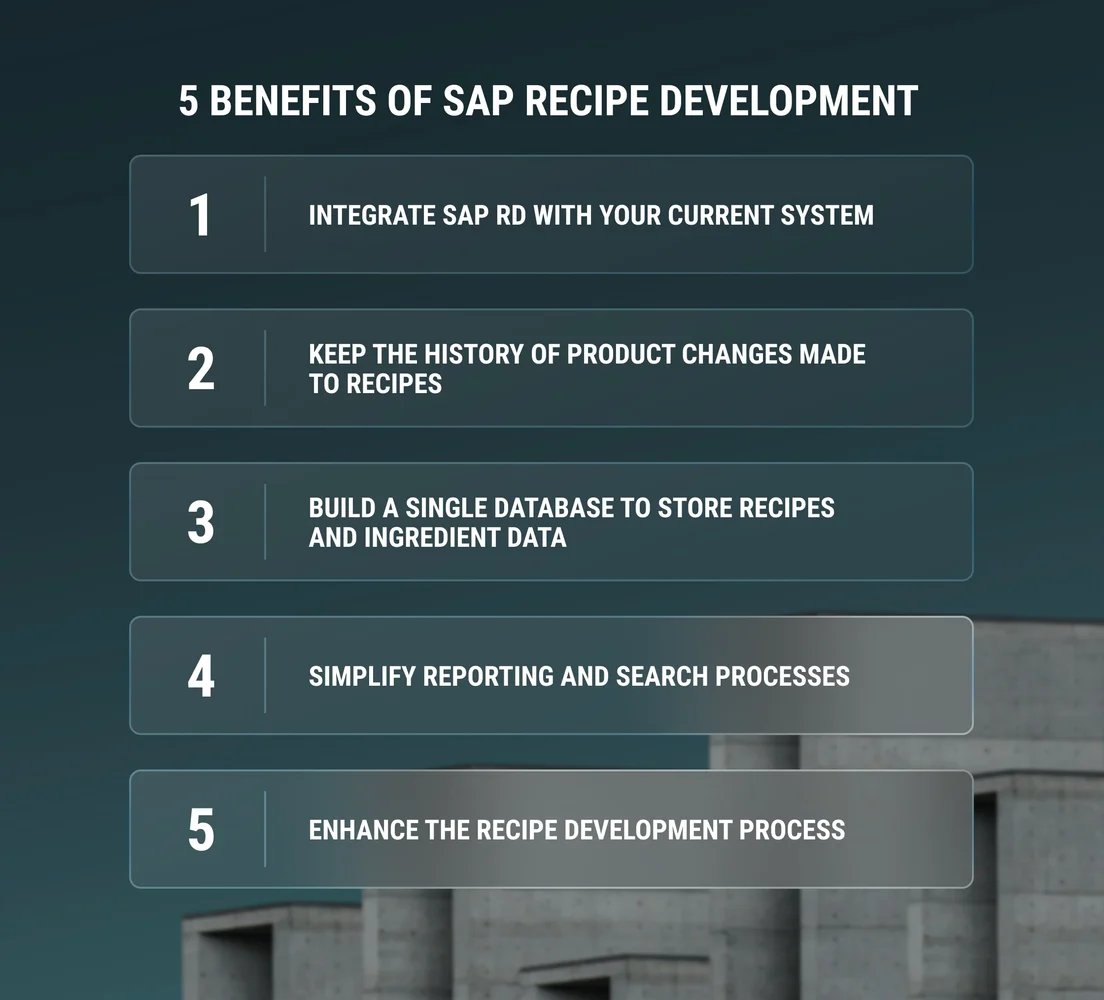Efficient recipe management requires a systematic approach to data collection and data management. With SAP Recipe Development, food and chemical companies can significantly improve recipe creation, ensuring faster processes and better communication across different divisions as well as with third-party stakeholders.
One Source of Truth Is Crucial for Recipe Development: Comments From LeverX Experts
Efficient recipe management requires a systematic approach to data collection and data management. With SAP Recipe Development, food and chemical companies can significantly improve recipe creation, ensuring faster processes and better communication across different divisions as well as with third-party stakeholders.
LeverX experts David Kramp and Sharon Vaughn shared their insights into why businesses need a recipe management system, and how they will benefit from it.
‘’Viewing the Recipe History: Top Reason Why a Company May Want a Recipe Management System’’
Sharon Vaughn: Recipes are widely used in food and chemical companies. They use technology solutions such as SAP Recipe Development to optimize the process. The main value of a recipe development solution is that it keeps the data necessary for creating products collected in one place.
The specification management system, which is foundational to many areas of SAP, is also foundational to recipe development. If an organization doesn’t have this foundational data systemized, they need to gather it from their suppliers. For example, a food company needs to store composition information, nutrient information, and other analytical information for each ingredient. Once it’s received, they need to enter it into specifications prepared for their particular business.
When you have this information in the system, you can start creating your recipes. So, the reason why a company would need a database system is to keep the history of each recipe. Every time employees update the recipe, all they need is to create a new version and then add updates to the new version. This means that the history of the recipe can be seen in its previous versions.
Here are a few examples of when a company might need the recipe history: they may have an inquiry from laboratories or have a customer that may ask about the label. It serves as the foundation for cross-communication — you can look back on what has been done or look into the future if you have a recipe that will become active in the future.
You don't have to create recipes from scratch every time: when customers have something new, such as a line extension, or something similar to an existing product, they can copy a recipe and make the desired changes to complete their new product.
David Kramp: The system can geographically segment the product into instances. For example, If you sell vegetable oil, you will have the same thing in Poland, France, etc. SAP Recipe Development allows you to create an instance for each country.
It's a configurable system for end-users to build out final recipe versions and labels for different countries, ensuring efficient recipe management. For example, there are different humidity levels in California and Louisiana, so you need to include a specific ingredient for one region’s recipe and exclude another one’s. When you have a single source of truth, you can make it faster and easier.

‘’Once You Implement a Recipe Management System, You Improve Speed to Market’’
Sharon Vaughn: Over the years, we've helped companies build recipe management systems and we have addressed many different client challenges. Typically, the areas most companies need assistance with are: сreating specifications, migrating data to specifications, creating recipe types, migrating data to recipes, and creating label sets for back-panel label reports.
One of the companies we worked with had never implemented any SAP product or any recipe system before. They only had technical data sheets and other documents from their supplier. When we implemented the SAP Recipe Development system, the challenge was to get the team together, which included product developers, quality, regulatory, etc. We had to manually transfer the details from documents onto the system. Once the information was entered into specifications, we started the next stage of the project, which is creating recipes. What we did as the project team was to train and assist with recipe development and label development.
David Kramp: When customers turn to LeverX, we dive deep into their challenges to identify what they need. Firstly, we would ask them what they are doing today. Are you working with PDFs your suppliers provided you with? Most PDFs are searchable but some are not. If you create a new product and you wanna reuse it, it's hard to find specific information. Then we would ask how long it takes to report and look for something? Typically, manual reporting based on gathering information from unstructured data sources is time-consuming, while with SAP, you have a very searchable database for recipe management. Once you implement a Recipe Management System, your time and money go down.
‘’Create a New Specification by ‘’Copying’’ or From Scratch’’
Sharon Vaughn: Before creating a new recipe, make sure you are familiar with your existing recipes. This will save time in the long run. Will the recipe be different from an existing one? Will it have significant changes? Would it be easier to create this recipe from scratch? During the webinar that takes place on April 12, we'll be looking into these two parts of recipe development and answer the questions below: How can I create a recipe based on the existing one? How do I make changes to it? How do I create a recipe from scratch?
Whether you need to revamp your current recipe development system or build it out from scratch, LeverX specialists are ready to help you. Contact us to find out how your company can get the most out of SAP PLM.
How useful was this article?
Thanks for your feedback!



-min.jpg)